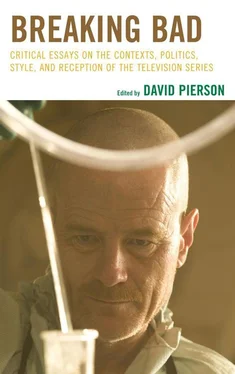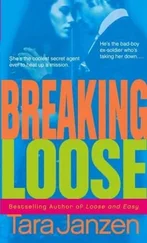Walter returns to the kitchen to make Krazy-8 another sandwich, throwing the pieces of broken plate in the garbage, and returning to the basement. This marks the beginning of a remarkable set-piece, lasting twelve minutes—a full quarter of the episode’s running time—establishing an emotional intimacy between the two that belies the reality of the circumstances, and in which Walter’s decision whether to kill Krazy-8 becomes a mutual determination.
The two now sit down, taking up more casual, less confrontational bodily positions. Walter rolls a can of beer to Krazy-8 from the six-pack he has brought with him to the basement, then asks Krazy-8 what his given name is: Domingo. Walter next questions Krazy-8 about his background. Instead of answering, Krazy-8 counters that getting to know him will not make it easier for Walter to kill him (nor, narratively, for the audience to witness). Krazy-8’s frankness in warning Walter about the dangers of ‘personalizing’ him serves as a strategic move on Krazy-8’s part, singling out his sincerity and capacity for truth telling because he does not immediately jump at the chance of humanizing himself to the clearly uncertain Walter. Rather than opting to establish the familiarity that is in Krazy-8’s best interests for survival, he appears to consider the predicament from Walter’s position as well. Krazy-8’s ability to appreciate Walter’s circumstances is critical to the encounter, as we will see. Further, Krazy-8 is being honest in that he is genuinely resentful of the situation, finding himself in a position of emasculating humiliation after having been outsmarted by a neophyte in the drug business, in which he perceives himself as having attained a certain status of prominence and toughness.
In a surprisingly honest—or desperate—countermove, Walter tells Krazy-8 that he is searching for a good reason to not kill him and Krazy-8 should tell him one. Here, Walter admits to what motivates his apparent gestures of kindness. Again, Krazy-8 returns the volley with a mixture of pride and defiance, telling Walter he could promise not to go after him if released, but that doing so is pointless because Walter will never know if he’s telling the truth or not. Thus, Krazy-8 initially rejects Walter’s efforts to establish a sympathetic connection between the two. He refuses to beg, grovel, or be submissive, even with his life at risk. Krazy-8’s courage must strike Walter as admirable, especially in light of his own failure of nerve. Both men have clearly staked out their positions in this encounter that is simultaneously a battle of wills and an intimate exchange.
Concluding that Krazy-8 is not willing to respond to his questions, Walter moves to leave the basement, spurring Krazy-8 to begin talking about himself, his educational background, his family. Krazy-8’s father owns a furniture store with which Walter is familiar. He explains that he knows who Krazy-8’s father is from the store’s TV commercials. His prisoner’s concession in responding to Walter provides the latter with a sense of victory, a moment in which Walter has exerted his power over the physically constrained and trapped Krazy-8. Effectively using the asymmetrical power relations between them, at this point Walter has prevailed.
Walter builds commonality on the basis of Krazy-8’s divulgences, telling his captive that he bought his son’s crib at the family’s furniture store, infusing a current of innocence into what, at its core, is a vicious encounter. His anecdote connects the two through their parallel relations as father or son, in a conversation in which the theme of family is woven throughout. Walter hands Krazy-8 another can of beer and the two sit in what appears to be or, at any rate, mimics comfortable familiarity. Walter is trying to prove that he is not a threat, even as he threatens Krazy-8, in order to convince Krazy-8 to view Walter in similar terms.
Krazy-8’s next comment signals a pivotal turning point in their emotional engagement, his apparent acceptance of Walter’s desired arrangement. Krazy-8 asks Walter if Jesse or Walter’s family know he has cancer. Walter acknowledges that Krazy-8 is the only person in whom he has confided because it’s not a conversation he is ready to have with his family. This is a crucial moment in their encounter because it signals that Krazy-8 understands Walter and what he is going through. He recognizes what Walter is experiencing emotionally and how important his admission of illness has been. This is a moment in which Krazy-8 extends awareness and empathy by acknowledging what Walter is unable to speak, an act of recognition that does much to constitute the scene’s strange tone of intimacy. Krazy-8 further affirms his empathic understanding by recognizing that Walter is cooking meth in order to take care of his family after his death. Krazy-8 thus validates that which Walter most wants acknowledged or, perhaps, to himself believe: that his illegal activities, up to and including murder, are undertaken out of his deep love for and commitment to his family and that, therefore, his actions are justified and his motives acceptable in terms of this perceived greater good. It is at this point that Walter decides not to kill Krazy-8. More accurately, the two reach the decision together. Walter returns to the kitchen to retrieve the key for the U-lock so that he can let Krazy-8 go. His eye is drawn to the pieces of broken plate in the garbage. He hastily begins reassembling the pieces, discovering that a large shard is missing. Krazy-8 had managed to reach it and conceal it while Walter was passed out.
Walter returns to the basement and grips the U-lock. But instead of unlocking it, he pulls it as tightly as he can against the concrete column, choking Krazy-8 to death. This is a prolonged act that requires his full strength, as Krazy-8 desperately tries to resist. Walter has fulfilled the act of “cold-blooded murder” that Krazy-8 predicted.
For Walter, their interaction has been about desperation: he has asked Krazy-8, almost pleaded with him, for another way out. But, for Walter, the encounter has also been about trust. He must come to believe, or be convinced, that he can trust Krazy-8, as unreasonable a proposition as that may sound. On Krazy-8’s part, also acting out of desperation to save his own life, he must convey honesty and sincerity in order to assure Walter that he is neither lying to nor manipulating his warder. This is why his frankness and defiance in refusing to promise he will not go after Walter is effective.
However, all of these emotional transactions, negotiated and exchanged, are undermined by the piece of broken shard in Krazy-8’s pocket. The fragment of broken plate becomes the marker of his broken word, extinguishing Walter’s unreasonable but heartfelt desire to trust Krazy-8. Ultimately, it is the breaking of trust—not the threat to Walter or his family—that, in contrast to his previous days of lethargy and procrastination, imbues him with the angry energy required to kill Krazy-8.
The set piece between Walter and Krazy-8 is action as transaction, constructed from moves and counter-moves: a strategic maneuver deployed, its effects sized-up, a corresponding response awaited, then delivered. Theirs is an ongoing series of thrusts and parries, all in terms of emotional, not physical, action. Their engagement takes shape as a negotiation, an exchange that moves forward, building to an inevitable but not initially predetermined outcome. This is the freedom or agency described by Foucault in the ability to either exert or resist power in ongoing transactions of social mobility.
And ultimately, it is Walter’s encounter with Krazy-8 that enables him to go home and entrust his wife with the news of his illness—if not of his drug-related, violent activities. The man Walter kills is the first person in whom he confides, making it possible to admit his own impending mortality to others, to his wife, and perhaps to himself. Although Walter’s and Krazy-8’s relations end in a brutal act of murder, the impact of their startling sequence together rests not solely in that final event but in the process taken to arrive at that point and in the unveiling of Walter’s motivations as he comes to believe that he must commit such an act. Their encounter stands as emblematic of the development of Walter’s character over the entire course of Breaking Bad , in which suspense and fascination are engendered by Walter’s process of determining what actions to take and the feelings, more than the reasons, he uses to justify his choices. The impact of the series does not derive solely from the audaciousness of Walter’s actions but, also, through the emotional process by which he comes to believe he must commit those acts and how he justifies them to himself and others. The physical action of the series’ opening two episodes serves to establish the emotional payoff of “…And the Bag’s in the River,” located in the drama, strategy, desperation and, ultimately, poignancy of the lengthy encounter between Walter and Krazy-8 that, in turn, renders the finale to their time together all the more ruthless.
Читать дальше












